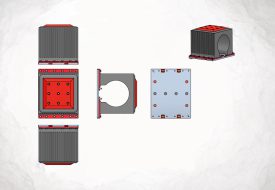What is a rubber fender?

The word ‘fender’ comes from the English verb ‘to fend off’, which means to ward off, and is used in the shipping industry. A fender is a (full) rubber block that absorbs the impact of a vessel as it is mooring, thus preventing damage to the ship, jetties and the quay. Fenders are also used for body works and industrial purposes.
Applications of a rubber fender
Rubber is ideally suited to fenders because it can absorb the energy that is released during the impact (energy absorption). Absorption improves, the more filler substances are in the rubber compound. During impact, the rubber can rebound, cancel out the energy from the impact while also reducing the impact speed. EPDM or SBR rubber is often used for rubber fenders.
Types of rubber buffer
D fender
A D fender is the most used rubber buffer. Thanks to the flat rear side of the D-shaped fender, it is easy to install. These rubber profiles are much heavier and thicker than standard bumpers. Large vessels tend to moor with a far heavier impact and D fenders ensure that the vessel is effectively protected.
Block fender
A block fender is a massive, rigid bumper, which is deployed in treacherous conditions for which D fenders are not strong enough.
Some other fenders are: Delta fenders, cylindrical fenders, keyhole fenders, M fenders and W fenders. At RIS Rubber we produce, in consultation with our clients, custom-made rubber fenders using new or existing blueprints.
Customer case
For Boskalis, RIS has developed a special fender that features several practical characteristics. Read more about this fender here.
Customer-specific rubber fenders
Rubber fenders are fitted horizontally, vertically or diagonally by means of bolts and/or strips. The assembly holes are provided on the side, or through the top and bottom of the fenders. Fenders can also be vulcanised with metal, ensuring that the rubber fender is more robust, or can be fitted more easily.
Are you looking for a rubber fender? We have been producing rubber fenders for many years and boast ample expertise. In addition, we can test rubber fenders on our premises and analyse them for required operation/effects. Please feel free to contact us to discuss the multiple possibilities.

